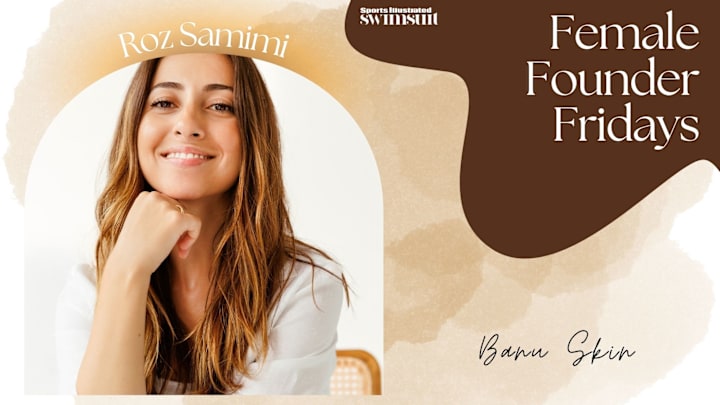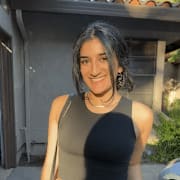Roz Samimi Built the Brand She Needed, Now It’s Changing the Conversation Around Acne

We’re spotlighting inspiring female founders who are making waves in their industries. Female Founder Fridays is all about celebrating their stories—how they built their brands, the challenges they’ve overcome and the lessons they’ve learned along the way.
For Roz Samimi, acne-safe isn’t a bonus, it’s the baseline.
The founder of Banu Skin spent over a decade navigating the emotional and physical toll of chronic acne. Prescriptions, dietary changes, monthly extractions—she tried everything her dermatologists recommended. But nothing worked. The problem wasn’t just her skin—it was the products.
“So many of my skincare products were full of pore-clogging ingredients, trapping me in a never-ending cycle of breakouts,” Samimi tells SI Swimsuit.
That realization became the spark for Banu: a brand rooted in science, tested on real people with acne-prone skin, and built with zero tolerance for shame. Samimi’s mission isn’t just to clear breakouts—it’s to create skincare that feels empowering, human and actually works.
The brand, which recently launched at Sephora, is already challenging the industry’s narrow, outdated idea of who gets acne and what they deserve from their routines.
From breakouts to breakthroughs
For years, Samimi did everything “right.” Dermatologist appointments, prescription creams, extractions, food journals—you name it. But her acne never let up. And worse, the products marketed to “help” were often making things worse.
“I struggled with chronic acne for years and did everything my dermatologist recommended—monthly extractions, prescriptions, dietary changes—but I kept breaking out,” she shares.
It wasn’t until she started inspecting ingredient lists that things clicked. Products that promised results were packed with pore-clogging agents, triggering the very breakouts they claimed to fix.
“That ‘Aha!’ moment changed everything,” she explains. “Once I swapped in the few truly acne-safe options I could find, my skin finally started to heal.”
Still, those options were limited—and often clinical, sterile and uninspiring. Samimi saw an opportunity not just to create better formulas, but to reimagine the entire acne category. That meant developing products that worked and made people feel good about using them. No more hiding breakouts. No more shame baked into the branding.
“The category needed a brand that treats acne-prone skin as the starting point—not an afterthought,” she says.
Banu’s current lineup includes three highly effective essentials: the Blemish Control Serum (packed with AHA and BHAs), the Hydrating Jelly Cleanser (a gentle chamomile face wash that melts away makeup and oil), and the Sulfur Spot Treatment (meant to shrink pimples and calm redness).
Shop at banuskin.com.
Science, standards, and starting over
From the beginning, Roz Samimi knew that Banu couldn’t just be thoughtful—it had to be thorough. Every product in the line is formulated without known pore-cloggers or fungal acne triggers and is tested on real people with acne-prone skin across all six Fitzpatrick skin types to ensure safety for every tone before it ever hits shelves. That level of rigor isn’t just for peace of mind; it’s the foundation of trust.
“All our products are clinically tested on real people with acne-prone skin, so there’s no guesswork or anxiety about whether it will trigger new breakouts,” she says.
It’s a level of transparency that stands out in a category crowded with vague claims and spot treatments. Effective formulas were only part of the equation, and just as important as how the brand made people feel.
“Acne can be incredibly isolating, so I wanted Banu to feel vibrant, human, and empowering—not clinical or sterile,” she says.
That ethos touches every detail—from the warm, vintage-inspired design to the joy-forward brand voice. And it all circles back to Samimi’s core belief: that clear skin shouldn’t come at the cost of dignity or delight.
Even the name Banu is intentional—it’s of Iranian origin, “and bringing a piece of my heritage into the American beauty market was deeply important to me,” she says. “For me, scientific rigor and joy aren’t opposites—they’re both essential to redefining acne care.”
Acne isn’t just a teen thing
If there’s one myth Roz Samimi is determined to break, it’s that acne only belongs to teenagers. The reality is far more complex—and far more common.
“One of the biggest myths about acne is that it’s just a teenage issue,” she explains. “In reality, hormones are with us for life—through cycles, pregnancies, postpartum changes, perimenopause, and beyond—so breakouts can flare at any stage.”
Banu was built with that full journey in mind. The formulas aren’t just reactive—they’re preventative, supportive and barrier-safe.
“Hormones play an essential role in skin health. During midlife, their shifting levels can disrupt the skin barrier, increase inflammation, alter the microbiome and heighten sensitivity to stress, all of which can contribute to breakouts,” Respin Health education lead and registered nurse Jill Chmielewski tells SI Swimsuit, adding that 41% of women who had adult acne had clear skin as teens.
Whether someone is dealing with flare-ups in their 20s or navigating menopause-induced breakouts, Banu aims to meet them where they are.
“The way you care for your skin as a teenager is very different from how you care for it as an adult,” Samimi explains. “With banu, my goal was to create formulas that work with your skin at every stage of life—while also supporting goals like hydration, brightness and barrier repair.”
It’s acne care without the expiration date, or the shame. Now available at Sephora, Banu is carving out space in the mainstream for something long overdue: skincare that centers acne-prone people from the start. For Samimi, that’s just the beginning.
“The next boundary I want to push is changing how the industry as a whole thinks about acne care,” she says. “Moving beyond ‘spot treatments’ and harsh regimens into a world where ‘acne-safe’ is the baseline across all skincare categories.”
Female Founder Q&A
What’s the best piece of advice you’ve received?
Take everyone’s advice with a grain of salt—even Sephora’s, even from the smartest person you’ve ever met who’s built and sold a successful skincare brand. Because no one knows your brand like you do. I love listening to people’s thoughts and feedback, but I always sit with it and ask myself if it truly makes sense for my brand. At the end of the day, staying true to what you’re building is the most important thing.
What do you wish you knew before starting your brand?
I wish I knew how much of this journey would be an emotional rollercoaster. The wins feel higher than you can ever imagine—landing a retail partner, seeing customers share their results, watching something you dreamed up come to life. But the lows can cut just as deep—setbacks in production, or the moments of self-doubt that creep in when you’re building something without a playbook. No one really prepares you for how often you’ll cycle between the two, sometimes in the same day. Learning to hold both at once—celebrating the highs while building resilience through the lows—has been one of the hardest but most important lessons.
What was your “I made it” moment?
I wish I could say I’ve had one defining “I made it” moment. The truth is, being a founder in the era of social media can make it feel like every win is instantly overshadowed by someone else’s bigger accomplishment. But when I pause and reflect, I realize I’ve had many: being selected for Sephora Accelerate as a pre-launch brand, launching on Sephora.com right out of the gate, and selling out within a week of launch. Each one felt huge at the time—but as a founder, you’re always looking ahead to the next milestone.
What has been the most unexpected challenge of running your business?
The most unexpected challenge has been realizing how much education is required around what “acne-safe” really means. Most people don’t realize how many everyday skincare products contain pore-clogging ingredients, or that “non-comedogenic” testing doesn’t actually reflect the experience of acne-prone skin. So much of our work has been about explaining the difference and giving people the tools to make more informed choices. It’s been a challenge, but also one of the most rewarding parts of building Banu—because every time someone learns something new about their skin, it reinforces why we exist.
What’s your favorite memory from starting the brand?
Showing my grandfather our first round of lab samples. He knew I was working on something, but it wasn’t until he saw the samples that he really understood what I was doing. He was a pharmacist in Iran, but left his career and had to start over when they moved to the US during the revolution. And he did that to give us a better life, so when he saw that I was creating products and a brand with an Iranian name, he was so proud and that was everything to me.
More SI Swimsuit Features:
feed
